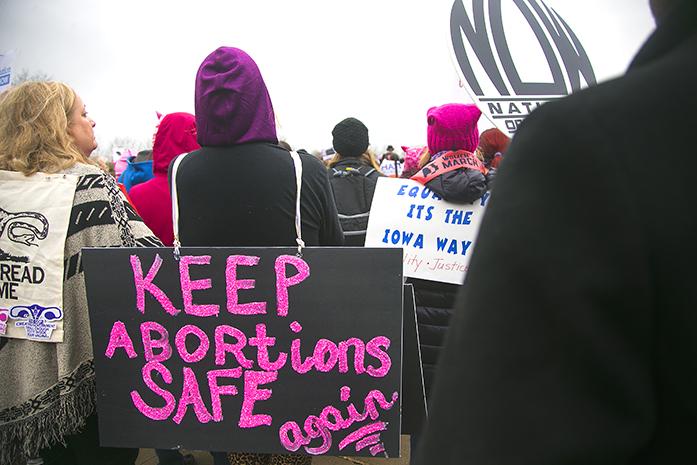By Maria Curi
The debate over women’s reproductive rights did not end with the Roe v. Wade decision in 1973.
On Monday, President Trump signed an executive action to reinstate the “Mexico City Policy” and, according to his Twitter feed, on Feb. 2, he will nominate an anti-abortion Supreme Court justice. Under these conditions, on Jan. 12, Rep. Steve King, R-Iowa, introduced what has come to be known as the “heartbeat bill.”
The bill would ban abortions around the six-week mark, or when the fetus’ heartbeat is first heard, with no exceptions for cases of rape or incest. It also includes a fine or up to five years of imprisonment for providers who perform abortions.
“It is unconscionable that the government would interfere with any woman’s health-care decisions, especially a survivor of rape or incest,” Rep. Dave Loebsack, D-Iowa, said.
Rachel Lopez, the public relations manager for Planned Parenthood of the Heartland, said not taking into account cases of rape or incest was “appalling” and “disgusting.”
Because it goes against the constitutional provision in Roe v. Wade that is meant to prevent an “undue burden” in abortion cases, some have said the heartbeat bill is unlikely to pass. But Mary Hoelscher, a member of the Dubuque County Right to Life Committee, believes otherwise.
“Republicans are in the majority, so I think that, in reality, there is a good chance this bill will be passed,” Hoelscher said. “Anything that is going to lessen abortions is a good thing. I have pro-choice friends who agree we should have a lower number of abortions.”
Lopez said that if the bill does pass, the number of abortions will not decrease.
“It is preposterous to assert that outlawing abortion will decrease abortion,” Lopez said. “What it will do is make it less safe for women and more women will die.”
Hoelscher said that although she believes the heartbeat bill will pass, it won’t be a smooth transition.
“It will be a hard time of transition, there will be massive pro-choice protests, but I do feel that eventually this [heartbeat bill] will be a deterrent and we will have fewer abortions,” Hoelscher said.
According to a 2007 study from the World Health Center and the Guttmacher Institute, illegality does not deter women seeking abortion services, instead it makes the process more dangerous for them.
“The surest way to reduce the number of unintended pregnancies is by increasing the availability of family-planning resources,” Loebsack said.
Under former President Obama, nongovernmental organizations did not receive funding for abortions, but they did receive assistance for other family-planning services, including contraception and post-abortion care. Trump’s reinstatement of the “Mexico City Policy” took away complete U.S. government funding from international nongovernmental organizations that promote or conduct abortion services.
“Like many of the bills introduced regarding a women’s right to choose, this bill [heartbeat bill] seeks to chip away at the protections contained in the Roe v. Wade decision,” Loebsack said.
According to the Pew Research Center, approximately 69 percent of Americans say Roe v. Wade should not be completely overturned.
“We can’t speak for all providers, but in the case of Planned Parenthood, our providers continue to be passionately committed,” Lopez said. “If the bill passes, it’ll go all the way to the Supreme Court. Once that scenario is upon us, we’ll address it, but right now it’s safe and legal.”
King did not respond to Daily Iowan photo requests and emails for comment this week.



